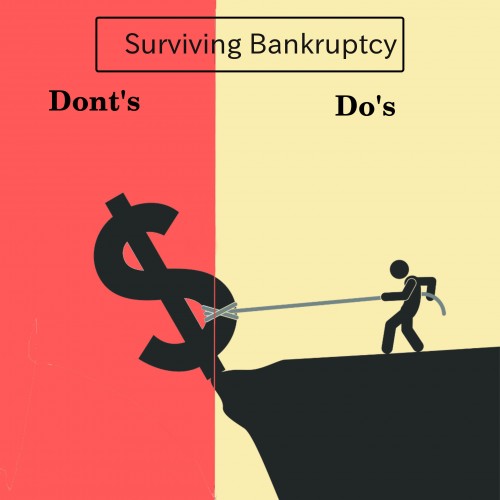
Are you experiencing rough nights that keep you awake with worry? Does debt feel unmanageable with no plan of action? Sometimes bankruptcy is the only viable solution to help get you towards better financial freedom—but there are some pertinent do’s and don’ts that will make your experience a more positive one. Read on to find out how.
Do: Explore all financial options before committing to filing for bankruptcy. It is imperative to note that future loan applications, credit scores, and wages could all be affected by making this big decision thus it should not be taken lightly.
Don’t: Withhold information, remember to be honest, there is no good that can come of withholding information—they are there to help you!
Do: Research different companies, trustees, and services to see which may be the best route for you.
Don’t: Run up credit cards or make large purchases thinking it will be forgiven once you file. This applies to credit card advances, pre-authorized checks, and balance transferring from one card to another. This money may still be required to pay back due to timing and case delays. Be smart and only spend what you must on basic necessities.
Do: Ask questions! Find out what may happen in terms of wage garnishing, asset seizure, payment terms, etc. It is best to be informed and prepared going forward.
Don’t: Deposit savings or transfer funds to family members or friends in hopes of protecting your income. This may affect your case and involve your loved ones in legal matters (it may even result in payments be required on their end as well). This includes ‘giving money away’ and putting anything into children’s savings or trust accounts.
Do: Make detailed notes and collect all necessary paperwork to show to your future trustee. The more information you can provide them with, the better they can assess your situation and provide you with the best solution possible.
Don’t: Renew preauthorized payments for memberships such as gyms, clubs, etc. Place a stop on all services you do not wish to keep immediately.

Do: Maintain regular payments where collateral is involved. This includes mortgage payments, car loans, etc. Include this information when preparing this information and remember to tell your trustee if you are behind on any payments to avoid seizure.
Do: Close your current bank account after all cheques have cleared (to avoid bouncing and the fees that will accrue) and open a new bank account to start fresh. If you don’t open a new account, your may lose all money you have not transferred when the bankruptcy case is filed. This may also affect future deposits. Reroute all paycheques to your new establishment.
Don’t: Cancel insurance policies on your home or cars. Keep payments current and timely.
Do: Continue to pay alimony and child support, these are payments that are not forgiven by filing for bankruptcy.
Don’t: Accept inheritance or winnings as they are subject to loss along with assets. Share all information on expected future earnings or monetary gifts to see what route may be best in terms of maintaining possession of these future funds.
Do: Provide your trustee with a list of all debts including those to family and friends.
Don’t: Make payments greater than $600 to family, friends, or business associates. This is considered showing preference to insiders, and will not bode well with case filing as the debts should be paid equally to all outstanding sources.
Do: Tell your trustee about all shared assets with family or spouse. It is imperative to prevent any complications in your case and attempt to protect loved ones from involvement.
Don’t: Be embarrassed about filing for bankruptcy, as there is a light after the dark road of debt—but Do avoid sharing the news unnecessarily as there is a stigma that can attach itself along with filing. This information can be kept from employers and friends, but must be disclosed if legal applications require it.
Do: Speak to your trustee and have them handle any communication with creditors and banks.
Don’t: Don’t let the problems persist! Call for a better tomorrow!
Author Bio:
The author of the article is Jeremy Benson. He has been writing about finance, mortgage and Canadian law since 7 years. Blogging is one among his greatest passions. Follow him on Twitter@jeremybenson19.







